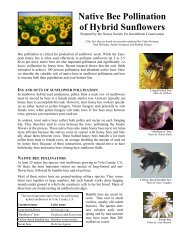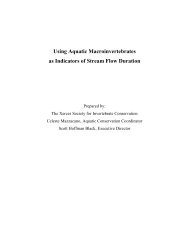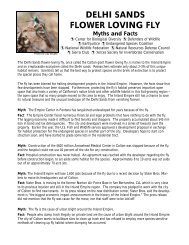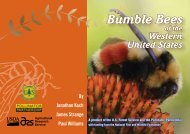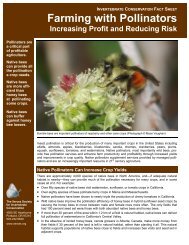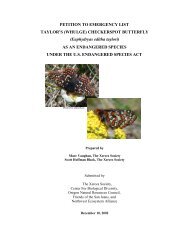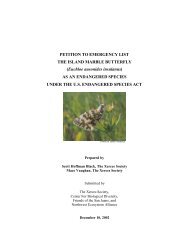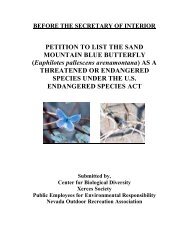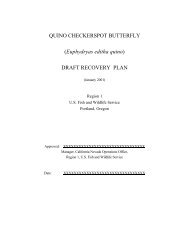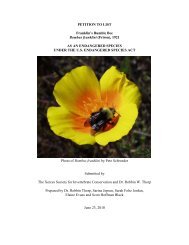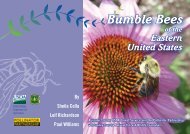Status Review of Three Formerly Common Species of Bumble Bee ...
Status Review of Three Formerly Common Species of Bumble Bee ...
Status Review of Three Formerly Common Species of Bumble Bee ...
You also want an ePaper? Increase the reach of your titles
YUMPU automatically turns print PDFs into web optimized ePapers that Google loves.
<strong>Bumble</strong> bee colonies can be infected with N. bombi and show no apparent symptoms,making it possible for apparently healthy colonies to carry and spread the pathogen.Because N. bombi can be present in areas throughout the bee body, surveys <strong>of</strong> N. bombicannot be restricted to smears from the gut and Malpighian tubules or to fecal sampling<strong>of</strong> spores, which is a method commonly used (Ronny Larson 2007). Methods haverecently been developed to detect N. bombi infections by PCR diagnosis, which providesa much more accurate picture <strong>of</strong> low-level infections (Klee et al. 2006).Researchers at the University <strong>of</strong> Illinois at Urbana-Champaign have identified amicrosporidium (Nosema bombi) in many North American bumble bees that isgenetically identical to that found in European bumble bees (Illinois Natural HistorySurvey Reports 2007). However, characterizing the geographic origins <strong>of</strong> different strains<strong>of</strong> N. bombi is complicated by the existence <strong>of</strong> multiple rRNA strains in single spores(O’Mahony et al. 2007). It is not presently clear whether this Nosema is an introducedspecies or if the pathogen occurs naturally in North American Bombus populations.Further testing will determine if this pathogen was recently spread to North Americanbumble bees (L. Solter, personal communication, March 2008).N. bombi has been shown to spread between bumble bee species both in the lab and thewild. N. bombi isolated from commercial European B. terrestris colonies exported toJapan were found to infect two native Japanese bumble bees in lab trials (Niwa et al.2004). N. bombi has been found in China in wild-caught Bombus lucorum and in queens<strong>of</strong> Bombus terrestris from New Zealand. B. lucorum are native to China and are closelyrelated to the non-native B. terrestris, which have been imported from New Zealand intoChina for pollination (Jilian et al. 2005). N. bombi and other bumble bee pathogens havebeen shown to spread from areas housing greenhouses employing commercial bumblebees to nearby wild bumble bees (Colla et al. 2006). As bumble bees in greenhousesfrequently forage outside the greenhouse (Whittington et al. 2004), it is likely that N.bombi could spread from commercial bumble bee colonies to wild populations throughshared use <strong>of</strong> flowers. Such a spread <strong>of</strong> disease could potentially decimate wildpopulations <strong>of</strong> closely related bumble bee species.In the mid-1990s, APHIS frequently issued courtesy permits for the interstate transport <strong>of</strong>bumble bees. In response to recommendations by bumble bee scientists, B. impatiens wasonly allowed to be distributed to eastern states and B. occidentalis only to western states,in order to try to keep each species within its respective native range (Flanders et al.2003), and thus prevent the spread <strong>of</strong> exotic diseases to wild populations <strong>of</strong> bumble bees.However, in 1997, large scale commercial rearing companies began to experienceproblems with infection by N. bombi in B. occidentalis colonies (Flanders et al. 2003;Velthius and van Doorn 2006). Supplies <strong>of</strong> B. occidentalis colonies were not able to meetthe demand <strong>of</strong> greenhouse tomato and cranberry growers. In response to growingrequests from western crop producers, APHIS decided to stop issuing all courtesy permitsin 1998, leaving the matter <strong>of</strong> regulating interstate movement <strong>of</strong> bees up to individualstate governments. This resulted in many growers bringing B. impatiens into westernstates for crop pollination (Flanders et al. 2003). Currently, the only western states thatregulate the importation <strong>of</strong> B. impatiens are Oregon and California; California allows B.25



